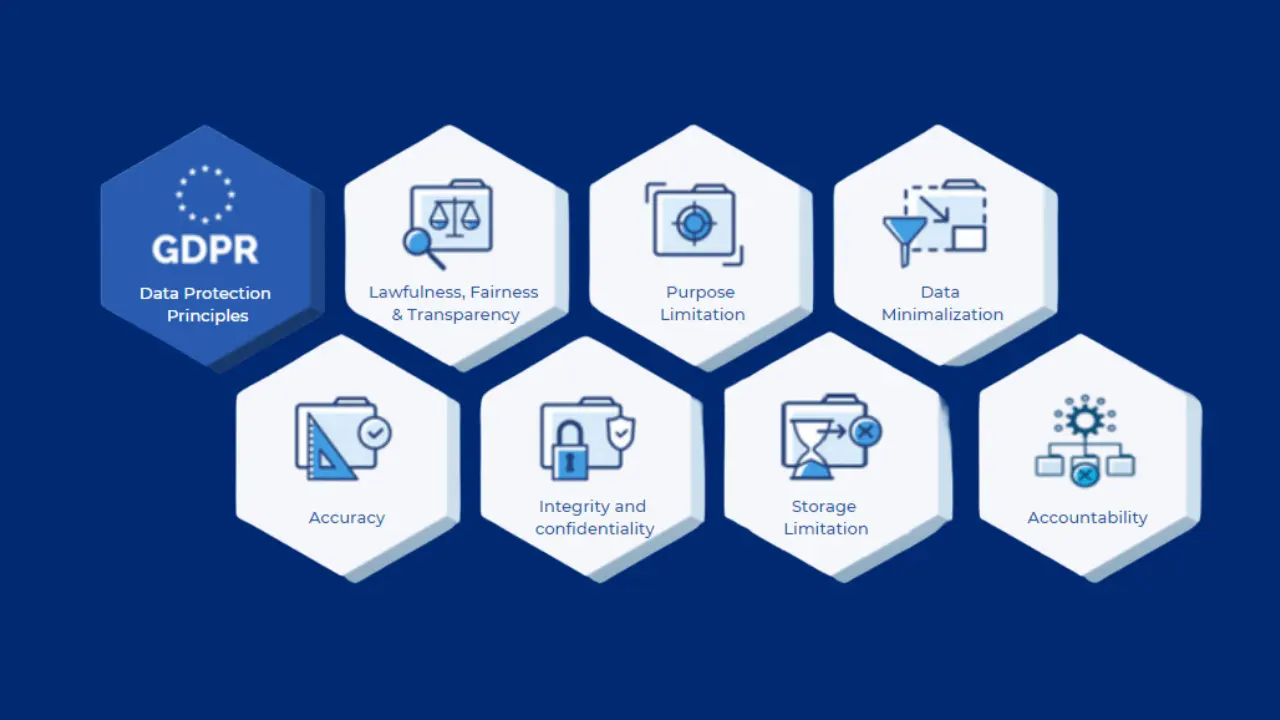The General Data Protection Regulation (GDPR) sets stringent standards for data protection in the European Union, impacting businesses globally. Achieving European GDPR compliance is crucial for companies handling personal data within the EU. Below is a guide to understanding and meeting EU GDPR compliance requirements, incorporating the six key features of GDPR for a comprehensive approach.
Understanding GDPR Compliance in the European Union
1. Scope and Applicability
GDPR applies to any organization that processes personal data of EU residents, whether based in the EU or not. This includes businesses outside the EU that offer goods or services to, or monitor the behavior of, EU data subjects. The regulation covers a broad range of data protection practices, from data collection to storage and processing.
2. Key GDPR Compliance Requirements
To achieve GDPR compliance, businesses must adhere to the following core principles, highlighted in the infographic:
- Data Minimization: Collect only the data necessary for the specific purpose.
- Lawful Basis for Processing: Ensure a legitimate reason for processing personal data, such as consent or a contractual obligation.
- Stricter Consent Conditions: Explicit consent is required for processing personal data, and businesses can no longer use implied consent. Companies must keep records of how and when consent was given and allow users to withdraw consent easily.
- Stronger User Rights: GDPR grants users eight rights, including the right to access, correct, and delete their data. Businesses must have processes in place to respond to these requests promptly and effectively.
- Data Protection Impact Assessments (DPIAs): Conduct DPIAs for high-risk processing activities to identify and mitigate potential risks. These assessments are mandatory when data processing activities are likely to result in a high risk to individuals’ rights and freedoms.
- Data Breach Notifications: GDPR mandates that data breaches that may pose a risk to individuals’ rights and freedoms must be reported to relevant authorities within 72 hours. Affected individuals must also be informed without undue delay.
- Appointing a Data Protection Officer (DPO): Organizations engaged in large-scale processing of personal data, especially those involving sensitive data, must appoint a DPO. The DPO oversees compliance, manages data protection activities, and acts as a point of contact for data subjects and supervisory authorities.
3. Data Protection by Design and Default
GDPR mandates that businesses incorporate data protection measures from the outset of any project or process (Data Protection by Design) and ensure that only necessary data is processed (Data Protection by Default). This requires companies to integrate privacy considerations into their operations, systems, and technologies.
4. Cross-Border Data Transfers
Under GDPR, transferring personal data outside the European Union requires ensuring an adequate level of data protection in the destination country. This can be achieved through mechanisms such as Standard Contractual Clauses (SCCs), Binding Corporate Rules (BCRs), or adequacy decisions by the European Commission.
Watch Video: Zycus GDPR Compliance and Data Security Measures
Challenges in Achieving EU GDPR Compliance
- Complexity and Scope: GDPR’s broad applicability makes compliance challenging for businesses of all sizes, especially those operating across multiple jurisdictions.
- Evolving Regulations: Staying updated with changes and interpretations of GDPR is crucial, as data protection authorities regularly issue new guidelines.
- Balancing Compliance and Innovation: Companies must balance the need for GDPR compliance with the desire to innovate, particularly in areas like AI and big data.
Best Practices for GDPR Compliance in the European Union
- Appoint a Data Protection Officer (DPO): For organizations involved in large-scale data processing, appointing a DPO can help ensure ongoing compliance.
- Conduct Regular Audits: Regular audits of data processing activities can identify potential non-compliance and areas for improvement.
- Employee Training: Ensure that employees are aware of GDPR requirements and their role in maintaining compliance.
- Use GDPR-Compliant Tools: Implement tools and software that support GDPR compliance by managing consent, data subject rights, and data protection measures.
- Documentation and Record-Keeping: Maintain detailed records of data processing activities, DPIAs, and data breach incidents to demonstrate compliance.
Read More: Navigating GDPR Compliance in EU Region Through Procurement Technology
How Zycus Can Support GDPR Compliance
While GDPR primarily focuses on data protection, Zycus’s Global Compliance solution plays a crucial role in ensuring that your procurement and supply chain operations align with global regulatory requirements, including GDPR. Zycus helps businesses streamline compliance efforts across different jurisdictions, reduce risks, and maintain transparency in their data management practices.
Consequences of Non-Compliance
Failing to achieve European GDPR compliance can result in significant penalties, including fines of up to €20 million or 4% of global annual turnover, whichever is higher. Additionally, non-compliance can damage a company’s reputation and erode consumer trust.
Conclusion
European GDPR compliance is not just a legal requirement but a crucial component of building trust with customers and safeguarding personal data. By understanding the core principles, addressing the challenges, and implementing best practices, businesses can navigate the complexities of EU GDPR compliance and ensure they meet the high standards of European data protection.
For companies seeking to align with GDPR compliance European Union standards, proactive measures, regular audits, and a commitment to data protection are essential. To explore how Zycus’s Global Compliance solution can support your GDPR efforts, schedule a demo with a Zycus product specialist today!
Related Reads:
- Zycus’s Predictions of GenAI in Procurement: Empowering the Future Today
- Leveraging GenAI for Smarter Contract Negotiation and Risk Management
- Whitepaper: 7 Intelligent Steps of Spend Data Aggregation & Analysis with GenAI: For Maximum Cost Savings
- Whitepaper: The CPO’s Guide to Mastering Generative AI in Procurement
- eBook: 10X Source to Pay with GenAI
- Redefining the Procure to pay Lifecycle with GenAI
- Embracing Analytics with GenAI: A Procurement Revolution in the Making
- Procure to Pay Consulting: How Generative AI is Transforming Advisory Services
- Challenges for GenAI Adoption in Procurement: Ethics, Data, & Security
- eBook: Strategic GenAI Adoption- A Blueprint for Modern Procurement Leaders





































